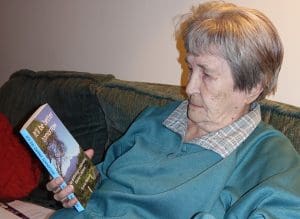 Tell us about yourself and how many books you have written.
Tell us about yourself and how many books you have written.
I was born in Neuchatel, Switzerland. My mother was Swiss, my father English and they met on a ship going to New Zealand. This may have contributed to that part of my genes which made me a travel writer. My school days were through World War Two in the suburbs of London. During that time, at the age of ten, I filled school exercise books with stories of a friendly dragon who took two human children on adventures. First they had to manoeuvre their way through barrage balloons, rising shells, descending bombs. At least that part of the stories was real.
I was really dedicated to travel and writing and not interested in marriage; but in the end I did marry at the age of 45 to George Spenceley, a lecturer, photograph, climber and explorer, who actually has a glacier named after him on the Antarctic island of South Georgia. In spite of a late marriage, we still managed 37 wonderful years together before he died in February 2013. I don’t think I shall stop missing him.
I became a travel writer, created short stories and eventually novels. Perhaps because of my childhood one of my favourite themes was ‘what war does to people’ – i.e. the effect of war on the children and grandchildren of participants. I wrote four novels on this theme, and then my first Young Adult book, dealing with addiction. There were also two anthologies of short stories. The latest of these came out in December 2014, then as an Ebook in January 2015 and an audio book in July 2015. My second anthology is called “It’ll be Better Tomorrow” – this was George’s title for it was what he said whenever I expressed concern about our future. He had many disabilities by then, including dementia. This anthology is dedicated to ageing. After George’s death I spent some time in a care home and discovered what an interesting lot we are.
What is the name of your latest book and what inspired it?
My latest book began as a novel, but then I saw that it was in fact all based on true events, so I turned it into a memoir called “So, what next? – a look, with hindsight at the moment world”. I realised that in my late eighties, I had lived through quite a lot of history including a childhood in World War Two, while my late husband had experienced this war as a pilot of Bomber Command, including as sole survivor of an air crash and three years as prisoner of war. Other aspects featured are bad decisions in the early 20th century leading to current Middle Eastern conflicts, social media, major changes in society and family structure, and uncontrolled (and uncontrollable) technology.
This book was published as a Kindle eBook in August 2017 and as a paperback in February 2018.
In 2018 I have also spent some time editing three of my books on the effects of war into a trilogy, which should shortly be ready under the title ‘Distant Echoes’, though each book within it can still be read separately
Do you have any unusual writing habits?
I don’t think it’s unusual to like curling up with a big scribbling pad and a pen; I really like the feel of pen on paper. Of course I also appreciate the options offered by computers to cut and paste, but they would be far better if they did not keep ‘improving’ programmes which are also frequently unreliable or incomprehensible!
What authors, or books have influenced you?
An awful lot over such a long lifetime. The ones whom I prefer to emulate are the ones that get straight into a story and who tell rather than show; though that’s not always easy.
What are you working on now?
A mystery story has been nudging in the back of my mind for some years, and geared to the retirement generation. It may become the fourth book following my trilogy
What is your best method or website when it comes to promoting your books?
I do talks on the subjects of my books, which is time-taking but quite productive. I also Face Book and twitter: especially organisations who focus on the subjects of my books. Promotion is not easy for self publishers, but I find that smaller publications connected with the subject of the book or the places where the story takes place can be helpful.
Do you have any advice for new authors?
Write every day, even rubbish; if you’ve got a block check through some earlier writing; if you are still blocked do some research. A writing friend suggested leaving your writing in the middle of a sentence at the end of the day as it made it easier to pick up.
What is the best advice you have ever heard?
As above
What are you reading now?
“The Strange Death of Europe by Douglas Murray and “The Square and the Tower” by Niall Ferguson, both focusing on how we have come to the place we are now, which I suspect will confirm my own pessimistic conclusions!
What’s next for you as a writer?
More writing, that’s for sure
If you were going to be stranded on a desert island and allowed to take 3 or 4 books with you what books would you bring?
Anything that is well written and extends our understanding of the strange world in which we live. I’m always delighted when new writing demonstrates there is still so much we do not know!
Author Websites and Profiles
Sylvie Nickels Website
Sylvie Nickels Amazon Profile